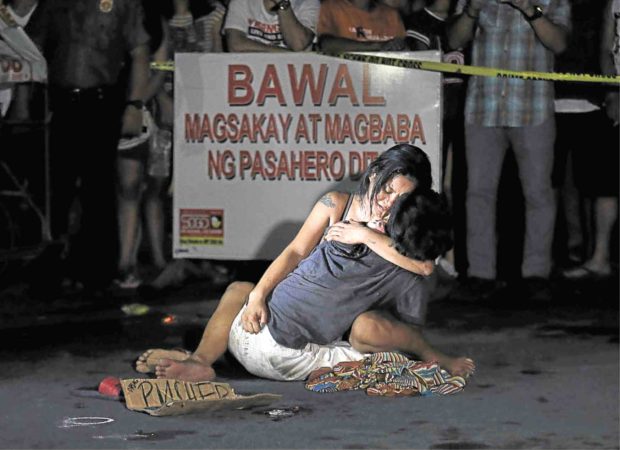
Jennilyn Olayres cradles partner, an alleged drug pusher Michael Siaron, who was killed in Pasay City on July 23, 2016. —File photo by Raffy Lerma of the Philippine Daily Inquirer
MANILA, Philippines — The Office of the President (OP) under President Rodrigo Duterte listed 20,322 drug war-related deaths among its accomplishments in a 2017 report, human rights lawyer Chel Diokno has revealed to a House of Representatives panel.
During the House Committee on Human Rights hearing on the alleged extra-judicial killings (EJKs) under Duterte’s drug war on Wednesday, Diokno explained that the 20,322 drug-war-related deaths from July 1, 2016, to November 27, 2017, were mentioned in a Supreme Court en banc resolution as part of the OP year-end report.
READ: Caloocan cop found guilty for ‘drug war’ deaths of two teens
“There has been much debate on how many persons have been killed in the war on drugs during the last administration. Some of the estimates have been as low as 12,000, while the NGOs have put the figure at 30,000. But there is one number that is unassailable because this comes from the Office of the President and was cited in an extended resolution of the Supreme Court,” Diokno said.
“And that number is 20,322 persons killed in the war on drugs. That number of 20,322 persons killed is only from the period of July 1, 2016, up to November 27, 2017. This is found in the 2017 year-end accomplishment report of the Office of the President and was cited in the resolution of the Supreme Court of April 3, 2018,” he added.
According to Diokno, of the 20,322 deaths, 3,967 happened during police operations while riding-in-tandem assailants and other still-unknown individuals did 16,355.
“That is not all, of the 20,322 who were killed according to the OP report, 3,967 Filipinos were killed by police in police operations, during the period from July 1, 2016, to November 27, 2017,” Diokno said.
“Then there is another figure, 16,355 killed by riding-in-tandem and other unknown persons during the same period — from July 1, 2016, this time, until September 27, 2017. 16,355, Mr. Chair,” he added.
READ: 3 policemen guilty of killing Kian delos Santos — court
Lawmakers were surprised to hear this number, as the official tally of the drug war at the end of the Duterte administration was around 6,250 deaths in legitimate police operations. This prompted ACT Teachers party-list Rep. France Castro to ask former executive secretary Salvador Medialdea if he had seen the document.
“Mr. Chair related to that, Mr. Medialdea, ES, former ES, so do you have a copy of the document being mentioned by Atty. Diokno, the year-end accomplishment report po?” Castro asked. “Tinatanong ko lang po kung have you seen that report.”
“I don’t think I’ve seen that report po,” Medialdea said.
When Medialdea fired back against Diokno’s remarks—calling them a sweeping statement—Diokno read out portions of the SC en banc resolution that mentioned the OP’s year-end report for 2017.
Diokno said the resolution was released when the legitimacy of Duterte’s drug war was being questioned before the High Tribunal.
“May I just be allowed to read a portion of the resolution? I quote from the resolution: Aside from the OSG submission in the present cases, we take judicial notice of the Duterte administration’s 2017 year-end report where deaths in cases related to illegal drugs and the internal cleansing conducted within the Philippine National Police are touted as accomplishments,” Diokno said.
“The government’s inclusion of these deaths among its other accomplishments may lead to the inference that these are state-sponsored killings,” Diokno said, still quoting the SC resolution.
The committee started its probe of Duterte’s drug war, particularly alleged EJKs in the conduct of the police operations, last May 21. The drug war, under Oplan Tokhang, was a project of Duterte’s close ally and first Philippine National Police (PNP) chief, Senator Ronald dela Rosa.
READ: House panel ready to probe into anti-drug war, extra-judicial killings
Tokhang was a portmanteau of Visayan words ‘toktok’ or to knock, and ‘hangyo’ or to plead — describing the police officers knocking on alleged illegal drug users and pushers’ doors to ask them to stop their involvement in the illegal trade.
While many praised the drug war for addressing the country’s drug menace, it was also criticized for being too bloody, and with innocent civilians — including minors — being dragged into the killing incidents.
In August 2017, 17-year-old Kian delos Santos was killed despite not being the original target of the anti-drug operation in Caloocan City. He was shot point-blank even if camera footage showed him pleading for his life.
Two days before delos Santos was killed, Arnaiz and de Guzman’s bodies were found in different areas – Arnaiz at a funeral in Caloocan City, and de Guzman, in a creek in Nueva Ecija.
Similar cases were used as a basis in the filing of complaints against Duterte and other drug war implementers before the International Criminal Court.

